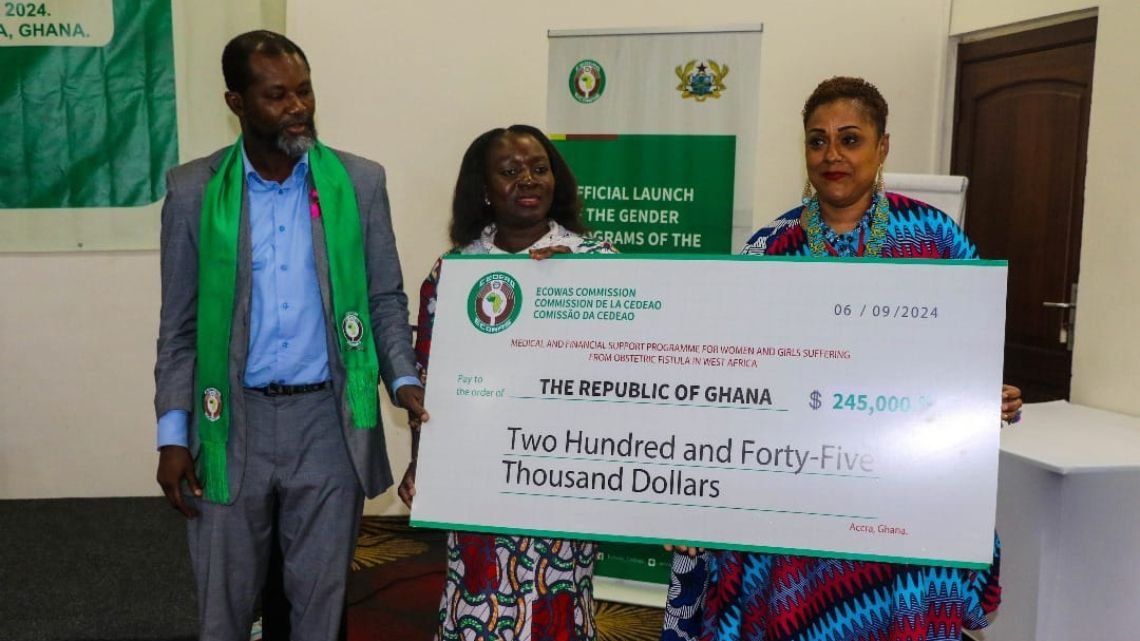The Economic Community of West African States’ (ECOWAS) Gender Development Centre has presented a $245,000 grant to bolster efforts in combating obstetric fistula and assisting affected Ghanaian women and other victims in the sub-region.
The funds are designated to support the treatment, prevention, and social reintegration of women suffering from the condition, which disproportionately affects those in underserved areas with limited access to maternal healthcare.
The body made the donation at the launch of the 2024 edition of the Obstetric Fistula Program under the theme “Strengthening Women’s Health Needs and Social Empowerment,” which aims to eradicate obstetric fistula across Ghana and West Africa.
The launch was executed by the Ministry of Health, in partnership with the Ministry of Gender, Children, and Social Protection in Ghana.
Research says Obstetric Fistula is a medical condition in women, primarily caused by prolonged and obstructed labor without timely medical intervention. It results in an abnormal opening between a woman’s birth canal (vagina) and her bladder or rectum, leading to chronic leakage of urine or faeces.

Speaking on behalf of Health Minister Dr. Bernard Okoe-Boye, Director of Allied Health, Dr. Ignatius Awinibuno, emphasized that obstetric fistula remains a significant health challenge for women in sub-Saharan Africa. He described the severe physical and social consequences of the condition, noting that many women suffering from fistula face isolation from their families and communities.
As part of the government’s strategy to address obstetric fistula, Dr. Okoe-Boye outlined the Ghana Health Service’s Obstetric Fistula Prevention and Management Strategic Plan (GOFPMSP), focusing on prevention, treatment, and social reintegration. “The availability of emergency obstetric care in remote areas, enhanced treatment capacity at facilities like the Tamale Fistula Centre, and vocational training for reintegrating affected women are all critical components of this plan,” he said.
Dr. Gabriel Ganyagio, representing the Ministry of Health’s Chief Director, Alhaji Hafiz Adam, also announced that significant upgrades are underway at the Tamale Fistula Centre, thanks to ECOWAS funding. “The rehabilitation of the Tamale Fistula Centre will equip it to provide not only surgical repairs but also comprehensive psychological and social support services for affected women,” Dr. Ganyagio remarked.

The Ministry of Gender, Children, and Social Protection, represented by Nyavor Victoria, reiterated that ECOWAS has initiated several programs aimed at improving the economic and health conditions of women and girls in Ghana. She mentioned scholarships for girls pursuing vocational and technical education, assistance for women suffering from obstetric fistula, and support for women in the agricultural and craft sectors.
“The ECOWAS Gender Development Centre has made significant strides in providing scholarships to deserving girls and offering direct support to women with obstetric fistula,” Ms. Victoria stated. She added that a gender analysis tool and feedback mechanisms have been implemented to ensure that the scholarships benefit the most deserving candidates.
The National Institutes of Health reports that globally, over 2 million girls and women live with obstetric fistula and 50 000–100 000 women develop obstetric fistula every year. In Ghana, 1352 women per 751, 205 deliveries develop obstetric fistula each year with an incidence rate of 1.8 per 1000 deliveries.
The most common symptom is continuous, involuntary leakage of urine (vesicovaginal fistula) or feces (rectovaginal fistula) through the vagina. Women with fistula often suffer from repeated urinary tract or vaginal infections due to the constant exposure of the affected areas to urine or faeces. The primary treatment for obstetric fistula is surgery to close the abnormal opening.

